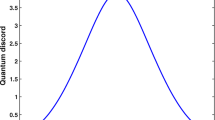Abstract
The model of innovation mechanism of university scientific research team under continuous optimization path is constructed by using quantum game theory, and two cases of unentangled and entangled states are compared. Then, the main factors affecting the model are discussed. In order to optimize the model and promote coordination and balance between the principal and the agent, the positive strategies and empirical test are provided. Interestingly, the multi-soliton phenomena in innovation mechanism are observed; the soliton in this model may have other implications in physics.




Similar content being viewed by others
Data availability
The authors declare that no data availability is used to support the study of this article.
References
Bai, Y.-H., Wang, Y.-Z., Wang, X.-H.: Study on quantum game and autonomic innovation capability. Oper. Res. Manag. Sci. 17(4), 61–66 (2008)
He, Y.-T., Xie, F.-J., Bai, Y.-H., Wang, Y.-Z., Wang, X.-H.S.: Research on the incentive mechanism of the industry- university institute collaborative innovation based on the quantum game theory. Syst. Eng Theor Pract 39(6), 1435–1448 (2019)
Bai, Y.-H., Wang, Y.-Z., et al.: Evaluation of independent innovation capability of institutes based on hawk- dove quantum games. Chin. Opt. 4(4), 340–254 (2011)
Jiang, Y.-H., Wang, L.-F., Fan, X.-Y.: Benefit distribution mechanism of cross-organizational technological innovation based on cooperative game. Sci. Tech. Manag. Res. 16, 185–199 (2021)
Zhang, Y.-K., Ma, J.: Research on collaborative information behavior from the interdisciplinary perspective: cooperation, balance and game. Inf. Doc. Serv. 41(1), 32–38 (2020)
Wang, X.-N., Sheng, Y.-X.: Research on cooperation strategy between enterprises and R&D institutions with dynamic game method. Manag. Rev. 32(2), 165–173 (2020)
Zhang, Y.-Q., Fan, R.-G., Luo, M.: Research on the evolutionary game and its simulation of short-sighted behavior in the indigenous innovation dilemma. Math. Pract. Theor 50(16), 90–102 (2020)
Wang, S.-L., Sun, W.-M., et al.: Quantum game analysis on extrinsic incentive mechanisms for P2P services. IEEE Trans. Parallel Distrib. Syst. 31(1), 159–170 (2020)
Wamg, L., Huamg, Z.: Research on the synergetic innovation between pharmaceutical enterprises and scientific research institutions based on the quantum game. IEEE Access 8, 63718–63724 (2020)
Trisetyarso, A., Hastiad, F.-F., Wang: Quantum game-based recommender systems for disruptive innovations. Lect. Notes Comput. Sci. 11431, 552–561 (2019)
Eisert, J., Wilkens, M., Lewenstein: Quantum games and quantum strategies. Phys. Rev. Lett. 83(15), 3077–3080 (1999)
Ikeda, K., Aoki, S.: Theory of quantum games and quantum economic behavior. Quantum Inf. Process 21(1), 033785 (2022)
Wang, S.-F.: Dynamics, synchronization control of a class of discrete quantum game chaotic map. Phys. A-Stat. Mech. Appl. 600, 127596 (2022)
Ikeda, K.: Quantum extensive form games (https://arxiv.org/abs/2207.05435). Quantum Physics (2022)
Wang, S.: The synchronization of discrete quantum chaotic maps with uncertainty via compensated control technique. Phys. D-Nonlinear Phenomena 443, 133556 (2023)
Ikeda, K.: Quantum contracts between Schrödinger and a cat. Quantum Inf. Process. 20, 313 (2021)
Acknowledgements
This work is supported by the Social Science Project of Guangxi Medical University (No. 2021B4) and the project (No. Gxmuzdjc 2120).
Author information
Authors and Affiliations
Corresponding author
Ethics declarations
Conflict of interest
The author declares there is no conflict of interest regarding the publication of this paper.
Additional information
Publisher's Note
Springer Nature remains neutral with regard to jurisdictional claims in published maps and institutional affiliations.
Rights and permissions
Springer Nature or its licensor (e.g. a society or other partner) holds exclusive rights to this article under a publishing agreement with the author(s) or other rightsholder(s); author self-archiving of the accepted manuscript version of this article is solely governed by the terms of such publishing agreement and applicable law.
About this article
Cite this article
Wang, S. The multi-soliton phenomena in quantum game model. Quantum Inf Process 22, 11 (2023). https://doi.org/10.1007/s11128-022-03761-w
Received:
Accepted:
Published:
DOI: https://doi.org/10.1007/s11128-022-03761-w




